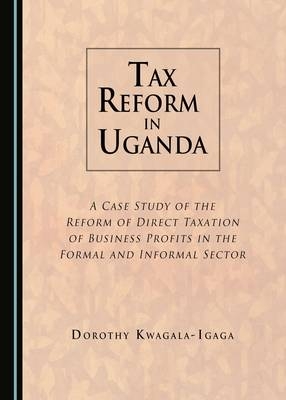
Tax Reform in Uganda
A Case Study of the Reform of Direct Taxation of Business Profits in the Formal and Informal Sector
Seiten
2016
|
Unabridged edition
Cambridge Scholars Publishing (Verlag)
978-1-4438-9113-4 (ISBN)
Cambridge Scholars Publishing (Verlag)
978-1-4438-9113-4 (ISBN)
In 1997, Uganda undertook extensive reforms in tax legislation. This had been preceded by the structural reforms in tax administration that saw the creation of the Uganda Revenue Authority in 1991. The aim of the far reaching reforms was to improve the tax system and increase its revenue productivity. This book demonstrates that the reforms were not as successful as anticipated and revenues have not improved in a sustained way. The revenue from direct taxes only contributes about 20% to the total revenue, well below the Sub-Saharan average of 40%. This has focused attention on the appropriateness of the reforms. The focus of the reforms on achieving efficiency did not sufficiently take into account the fundamental importance of equity within the system. As a result, the Income Tax Act 1997 embodies distortions and inequalities in the treatment of taxable income and taxpayers that have led to inefficiency in the system as a whole. The tax reforms also took a narrow technical view of the tax system.The book employs political economy and optimal theory to explain the weaknesses in the tax system. It is argued that the reforms, although well designed, were not likely to be successful given the timing and context of implementation. The multidisciplinary and functionalist approach of the book is helpful in highlighting the constraints in which tax design and tax reform is undertaken in Uganda. It is argued that the reforms we “blunted” by the manner of their formulation and context of implementation. Taxation is a socio-political issue and yet the IMF and World Bank which supported the reforms did not take into account the limited political will. The lack of consensus in policy formulation has weakened the socio-contract and allowed the government to blame external factors for the poor performance. The weaknesses in governance and corruption have had an impact on the tax system by encouraging tax avoidance and evasion among political elites as well as on activities in the informal sector.
Dorothy Kwagala-Igaga is a Senior Lecturer at Roehampton University specialising in Tort Law. She joined Roehampton Law School in June 2016 from Kingston University where she taught Tort and English Legal System and Legal Method between 2011 and May 2016. She obtained a Phd in Tax Policy from Warwick University where she was a Graduate Research and Teaching Fellow from 2006 to 2011. Prior to joining Warwick University, she was a lecturer at Makerere University Kampala and Uganda Christian University and an Advocate at Public Defenders Association of Uganda. She obtained an LLM from Cambridge University in 2001 and LLB from Makerere University in 1999.
| Erscheinungsdatum | 13.08.2016 |
|---|---|
| Verlagsort | Newcastle upon Tyne |
| Sprache | englisch |
| Maße | 148 x 212 mm |
| Themenwelt | Recht / Steuern ► Steuern / Steuerrecht |
| Wirtschaft ► Volkswirtschaftslehre ► Wirtschaftspolitik | |
| ISBN-10 | 1-4438-9113-4 / 1443891134 |
| ISBN-13 | 978-1-4438-9113-4 / 9781443891134 |
| Zustand | Neuware |
| Haben Sie eine Frage zum Produkt? |
Mehr entdecken
aus dem Bereich
aus dem Bereich
Einführung in die Finanzwissenschaft
Buch | Softcover (2022)
Springer Gabler (Verlag)
44,99 €
Theorie und Anwendung
Buch | Hardcover (2024)
Vahlen, Franz (Verlag)
39,80 €
wie sich unsere Wirtschaftspolitik ändern muss, damit wir globale …
Buch | Hardcover (2024)
Wiley-VCH (Verlag)
39,99 €


